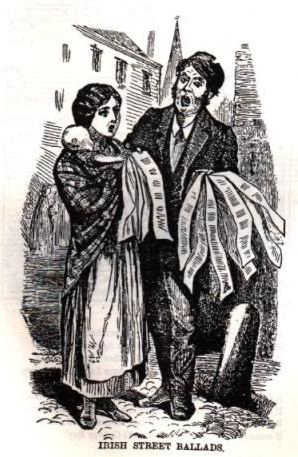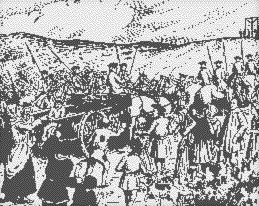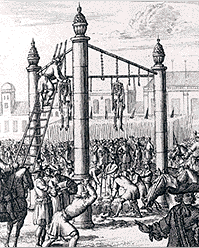The next broad-sheet is the Life, Trial, Confession, and Execution. This
presents the same matter as the Lamentation, except that a part - perhaps the
judge's charge at the trial, or perhaps the biography - is removed to make room for
 the Execution, and occasionally for a portion of the Condemned Sermon.
I cite the Life, Trial, Confession, and Execution of Mary May, for the Murder of
W. Constable, her Half-brother, by Poison, at Wix, near Manningtree:
the Execution, and occasionally for a portion of the Condemned Sermon.
I cite the Life, Trial, Confession, and Execution of Mary May, for the Murder of
W. Constable, her Half-brother, by Poison, at Wix, near Manningtree:
"At an early hour this morning the space before the prison was very much crowded by
persons anxious to witness the execution of Mary May, for the murder of William Constable,
her half-brother, by poison, at Wix, Manningtree, which gradually increased to such a
degree, that a great number of persons suffered extremely from the pressure, and gladly
gave up their places on the first opportunity to escape from the crowd. The sheriffs and
their attendants arrived at the prison early this morning and proceeded to the condemn
cell, were they found the reverend ordinary engaged in prayer with the miserable woman.
After the usual formalities had been observed of demanding the body of the prisoner into
their custody she was then conducted to the press-room. The executioner with his
assistants then commenced pinioning her arms, which opporation they skillfully and quickly
dispatched. During these awful preparations the unhappy woman appeared mently to suffer
severely, but uttered not a word when the hour arrived and all the arrangements having
been completed, the bell commenced tolling, and then a change was observed, to come over
the face of the prisoner, who trembling violently, walked with the melancholy procession,
proceeded by the reverend ordinary, who read aloud the funeral service for the dead. When
the bell commenced tolling a moment was heard from without, and the words Hats off,
and Silence, were distinctly heard, from which time nothing but a continual
sobbing was heard. On arriving at the foot of the steps leading to the scaffold she
thanked the sheriffs and the worthy governor of the prison, for their kind attentions to
her during her confinement; & then the unfortunate woman was seen on the scaffold,
there was a death like silence prevailed among the vast multitude of people assembled.
In a few seconds the bolt was drawn, and, after a few convulsive struggles, the unhappy
woman ceased to exist."
I cannot refrain from calling the reader's attention to the copy of verses
touching Mary May. They seem to me to contain all the elements
which made the old ballads popular - the rushing at once into the subject - and the
homely reflections, though crude to all educated persons, are, nevertheless, well adapted
to enlist the sympathy and appreciation of the class of hearers to whom they are addressed:
In Essex boundry I did dwell,
my brother lived with me,
In a little village called Wix,
not far from Manningtree.
In a burial club I entered him,
on purpose him to slay;
And to obtain the burial fees
I took his life away.
His tea for him I did prepare,
and in it poison placed,
To which I did administer, -
how dreadful was his case.
I strove the money to obtain,
for which I did him slay,
By which, also, suspicion fell
on guilty Mary May.
And for this most atrocious deed
I at the bar was placed,
The Jury found me guilty, -
how dreadful was my case.
The Judge the dreadful sentence pass'd,
and solemn said to me,
You must return from whence you came,
and thence unto the tree.
Good people all, of each degree,
before it is too late,
See me on the fatal tree,
and pity my sad fate.
My guilty heart stung with grief,
with agony and pain, -
My tender brother I did slay
that fatal day for gain.
To show the extent of the trade in execution broad-sheets, I obtained returns of the
 number of copies relating to the principal executions of late, that had been sold.
number of copies relating to the principal executions of late, that had been sold.
| Of Rush | 2,500,000 copies |
| " the Mannings | 2,500,000 " |
| " Courvoisier | 1,666,000 " |
| " Good | 1,650,000 " |
| " Corder | 1,650,000 " |
| " Greenacre | 1,666,000 " |
Reckoning that each copy was sold for 1d. (the regular price in the country, where the
great sale is), the money expended for such things amounts to upwards of 48,500l. in the
case of the six murderers above given.
Links:
Street-Sellers, Chaunters and Minstrels (FW#26)
London Labour and the London Poor
Back to the content of FolkWorld Features
To the content of FolkWorld No. 28
© The Mollis - Editors
of FolkWorld; Published 04/2004
All material published in FolkWorld is © The
Author via FolkWorld. Storage for private use is allowed and welcome. Reviews
and extracts of up to 200 words may be freely quoted and reproduced, if source
and author are acknowledged. For any other reproduction please ask the Editors
for permission. Although any external links from FolkWorld are chosen with greatest
care, FolkWorld and its editors do not take any responsibility for the content
of the linked external websites.
FolkWorld - Home of European Music

Layout & Idea of FolkWorld © The
Mollis - Editors of FolkWorld
 good murder, or of a murder expected to turn out well, is systematic. First
appears a quartersheet (a hand-bill, 9½ in. by 7½ in.) containing the
earliest report of the matter. Next come half-sheets (twice the size) of later
particulars, or discoveries, or - if the supposed murderer be in custody - of further
examinations. Then are produced the whole, or broad-sheets (twice the size of the
half-sheets), and, lastly, but only on great occasions, the double broad-sheet.
good murder, or of a murder expected to turn out well, is systematic. First
appears a quartersheet (a hand-bill, 9½ in. by 7½ in.) containing the
earliest report of the matter. Next come half-sheets (twice the size) of later
particulars, or discoveries, or - if the supposed murderer be in custody - of further
examinations. Then are produced the whole, or broad-sheets (twice the size of the
half-sheets), and, lastly, but only on great occasions, the double broad-sheet.
 the Execution, and occasionally for a portion of the Condemned Sermon.
I cite the Life, Trial, Confession, and Execution of Mary May, for the Murder of
W. Constable, her Half-brother, by Poison, at Wix, near Manningtree:
the Execution, and occasionally for a portion of the Condemned Sermon.
I cite the Life, Trial, Confession, and Execution of Mary May, for the Murder of
W. Constable, her Half-brother, by Poison, at Wix, near Manningtree:
 number of copies relating to the principal executions of late, that had been sold.
number of copies relating to the principal executions of late, that had been sold.
